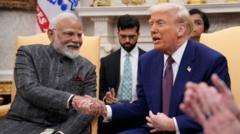During a bilateral meeting, President Trump and Prime Minister Modi focused on trade relations with the backdrop of recently announced tariffs that may affect international trade dynamics.
Trade Talks Between Trump and Modi Amidst New Tariffs Order

Trade Talks Between Trump and Modi Amidst New Tariffs Order
US President Donald Trump discusses trade and immigration with Indian PM Modi while implementing new tariffs.
In the Oval Office, US President Donald Trump met with Indian Prime Minister Narendra Modi for discussions centered around trade policies and ongoing bilateral relations. Modi's two-day visit has gained significance with Trump’s recent directive to impose reciprocal tariffs on US trading partners, a strategy aimed at creating a balanced trading environment.
The contentious backdrop of US tariffs comes in the wake of Trump's assertion that American allies have often created unfair trading conditions. According to the White House, while the average tariff on US agricultural goods remains at 5% for countries with Most Favored Nation (MFN) status, India’s average applied tariff stands at a staggering 39%. Additionally, the US only imposes a 2.4% tariff on Indian motorcycles, in contrast to India’s 100% on US motorcycles.
Modi, who is keen on amplifying his nation’s trade agreements, acknowledged the positive rapport that has grown between him and Trump. He expressed optimism regarding their ongoing collaboration, saying, “I firmly believe with Trump we will work with twice the speed we did in his first term.”
While addressing the possibility of price increases resulting from newfound tariffs, Trump offered a perspective for the long term, stating that American manufacturing would rebound and job creation would spike despite any temporary rise in consumer prices. "Prices could go up somewhat, short term, but prices will also go down," he articulated to reporters.
Additionally, immigration remains a point of contention, with Trump expected to request India’s assistance in repatriating thousands of undocumented immigrants residing in the US. Modi’s discussions also extended to space and technology collaborations, which he previously celebrated with tech entrepreneur Elon Musk.
Overall, this high-stakes meeting between the US and India underscores a complex interplay of trade negotiations, tariff policies, and a shared vision for a strengthened economic partnership between the two nations.
The contentious backdrop of US tariffs comes in the wake of Trump's assertion that American allies have often created unfair trading conditions. According to the White House, while the average tariff on US agricultural goods remains at 5% for countries with Most Favored Nation (MFN) status, India’s average applied tariff stands at a staggering 39%. Additionally, the US only imposes a 2.4% tariff on Indian motorcycles, in contrast to India’s 100% on US motorcycles.
Modi, who is keen on amplifying his nation’s trade agreements, acknowledged the positive rapport that has grown between him and Trump. He expressed optimism regarding their ongoing collaboration, saying, “I firmly believe with Trump we will work with twice the speed we did in his first term.”
While addressing the possibility of price increases resulting from newfound tariffs, Trump offered a perspective for the long term, stating that American manufacturing would rebound and job creation would spike despite any temporary rise in consumer prices. "Prices could go up somewhat, short term, but prices will also go down," he articulated to reporters.
Additionally, immigration remains a point of contention, with Trump expected to request India’s assistance in repatriating thousands of undocumented immigrants residing in the US. Modi’s discussions also extended to space and technology collaborations, which he previously celebrated with tech entrepreneur Elon Musk.
Overall, this high-stakes meeting between the US and India underscores a complex interplay of trade negotiations, tariff policies, and a shared vision for a strengthened economic partnership between the two nations.



















